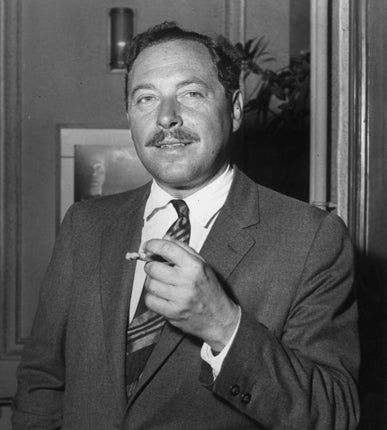He might have preferred to depend upon the kindness of strangers, but when Tennessee Williams attempted to launch his career in the West End theatres of post-war London, he met an altogether less friendly response: no sex, please, we're British.
A collection of the American playwright's private letters and documents being exhibited this month detail his extraordinary clashes with official censors who attempted to prevent both A Streetcar Named Desire and Cat on a Hot Tin Roof being staged in the UK.
They demonstrate how the Lord Chamberlain of the time, an Earl and former Tory MP in charge of licensing all new theatrical productions, took great exception to fruity language and blasphemy in the plays, which are today considered modern classics. His most furious moustache-twitching, the letters reveal, was prompted by references to homosexuality, which was illegal on both sides of the Atlantic. To the dismay of Williams, who was gay, he demanded that all but the most veiled references be cut.
A letter by the Lord Chamberlain to producers of the first London production of Streetcar reveals that eight changes were required, mostly to lines of the play's volatile protagonist, Blanche DuBois. They included the deletion of the supposedly offensive word "rutting," and a stern instruction that during the play: "there must be no suggestive business accompanying any undressing". The censor further demanded that a famous scene in which DuBois recalls how she discovered her first husband in a romantic clinch with a gay lover should be reworked to leave the audience with the impression that the liaison had been heterosexual.
Streetcar was eventually staged, with Laurence Olivier as a director, in 1949, two years after it had opened on Broadway. But an effort to bring Cat on a Hot Tin Roof to the UK almost a decade later met even more severe difficulties. A 1955 letter from the Lord Chamberlain – part of a collection at the Harry Ransom Center at the University of Texas – reveals that the producers were told to make 34 changes to the script before it was deemed acceptable for London.
Williams was told to delete allegedly offensive words, including "crap", "Christ", "Jesus", "bull crap", "frig", "half ass", "boobs", "humping" and "ass-aching". He was also told to cut a paragraph in which a character discusses a sexual liaison by saying: "I laid her, regular as a piston."
More troublesome were instructions to remove entire pages that referred to the homosexuality of Brick, a prominent character. Phrases such as "ducking sissies" and "queers" had to be cut. A typical paragraph reads: "The discussion on page 45 [must] be altered, so as to eliminate the suggestion that there may have been a homosexual relationship."
Since homosexuality is central to the play, Williams refused to make the changes. Letters between his producers and literary agent reveal how they decided to circumvent decency laws by turning the Comedy Theatre in London into a private members' club. Directed by Peter Hall, the play opened controversially in 1958.
Cathy Henderson, who helped curate the Texas exhibition, says the arguments over homosexuality foreshadowed later rows with Hollywood censors, who were reluctant to endorse the 1950s film of Streetcar. "He [Williams] minded that his scripts were altered, but he did understand that he was pushing the envelope, and that sometimes compromises would have to be made," she said.
Experts on post-war theatre say the prudish response was typical of the UK censor of the time. "The biggest arguments tended to revolve around plays coming to London from the US, since most British playwrights edited themselves," says Sheffield University's Dr Steve Nicholson, co-author of The Lord Chamberlain Regrets: A History of British Theatre Censorship. The Lord Chamberlain's role as censor was abolished in 1968, allowing shows such as Hair to run in the West End. Many of his letters to producers are kept in the British Library, where they are occasionally mined by academics.
Subscribe to Independent Premium to bookmark this article
Want to bookmark your favourite articles and stories to read or reference later? Start your Independent Premium subscription today.


Join our commenting forum
Join thought-provoking conversations, follow other Independent readers and see their replies